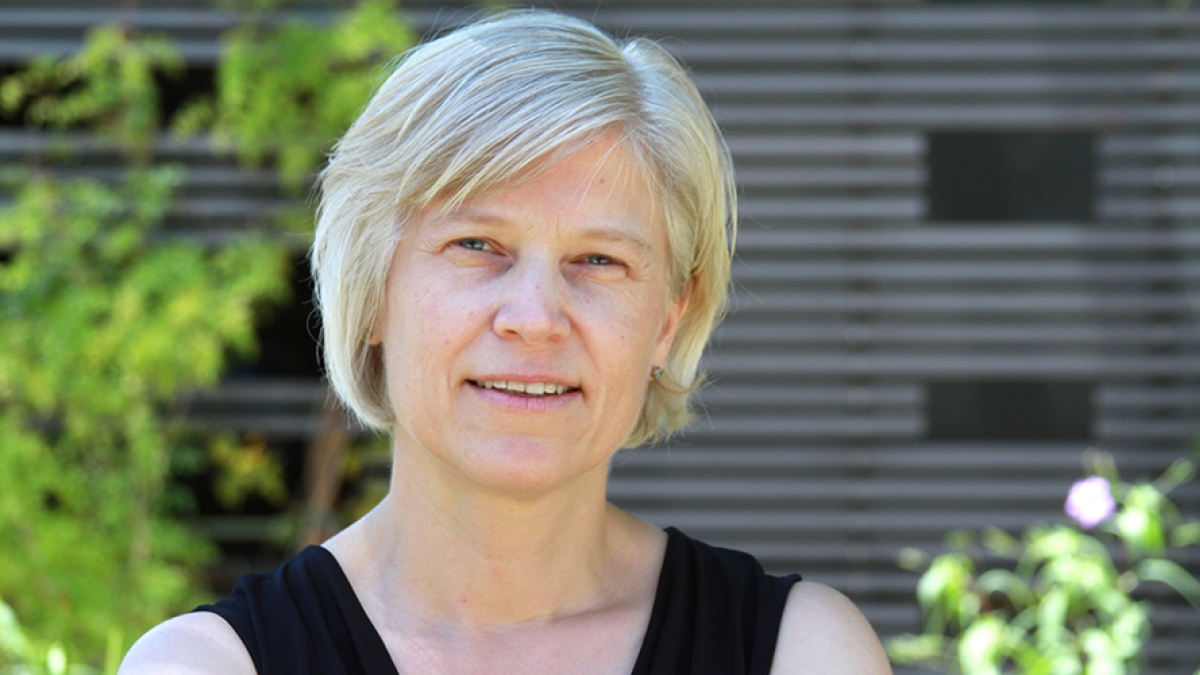ASU School of Molecular Sciences professor recognized with midcareer achievement award

Alexandra Ros, a professor in ASU’s School of Molecular Sciences and the Center for Applied Structural Discovery in the Biodesign Institute. Photo by Mary Zhu
Arizona State University's Alexandra Ros has just received the Advancing Electrokinetic Science Electrophoresis Society Mid-Career Achievement Award for her exceptional contributions to the field of electrophoresis and microfluidics.
In a field dominated by men, Ros more than holds her own.
Ros is a professor in ASU’s School of Molecular Sciences and faculty member in the Biodesign Institute’s Center for Applied Structural Discovery. Her current research interests include migration mechanisms in the micro- and nano-environment for biomolecules and subcellular species with a focus on electrokinetic methods, hyphenation of analytical approaches for single cell analysis, and development of microfluidic tools for emerging crystallography techniques.
“Alexandra’s work is typified by outstanding scholarship and a relentless commitment to making critical advances that benefit science and society at large,” said Ian Gould, interim director of the School of Molecular Sciences. “I am very happy to see her recognized with this outstanding and richly deserved award.”
“I am deeply grateful to the Electrophoresis Society for honoring me with this award,” Ros said.
The Federation of Analytical Chemistry and Spectroscopy Societies (FACSS) has organized an international conference at the forefront of analytical chemistry and allied sciences since 1974. In 2011, this conference was renamed to the SciX Conference presented by FACSS with the tagline, "The Great Scientific Exchange."
The SciX conference continues to grow because it is highly valued by attendees for its technical program, world-class exhibits and many career-building networking opportunities. It was at this recent conference where Ros was presented the award by Advancing Electrokinetic Science President and Professor Christopher Harrison.
Other prestigious awards Ros has received include a NSF CAREER award (2012), a Humboldt Fellowship for Experienced Researchers (2015) and an Innovation Award from FACSS (2018).
She received her diploma in chemistry from the Ruprecht-Karls University in Heidelberg, Germany, and her PhD from the Swiss Federal Institute of Technology in Lausanne, Switzerland.
As a postdoctoral researcher, Ros developed an interest in microfluidic platforms and their analytical applications. She joined the Biophysics and Nanoscience Group at Bielefeld University, Germany, in 2000, where she followed her interests in this area.
From 2001 to 2006, she served as principal investigator at Bielefeld University, Germany, where she led several projects on migration mechanisms and single cell analysis in the microfluidic format. In 2007, she finished her Habilitation and received the Venia Legendi in experimental physics from Bielefeld University.
She then joined Arizona State University in 2008 as assistant professor where she was promoted to associate professor in 2014 and full professor this year. In 2015 and 2016, Ros was appointed visiting scientist at the Georg-August University in Goettingen, Germany.
Ros has recently developed a unique method for reducing sample size and waste (which can be as high as 99%) in her team’s serial femtosecond crystallography with X-ray free electron laser (XFEL) experiments.
The method is specifically appealing for hard-to-crystallize proteins, such as membrane proteins, as it yields high-resolution structural information from small micro- or nanocrystals, thus reducing the contribution of crystal defects and avoiding tedious (if not impossible) growth of large crystals, as is required in traditional synchrotron-based crystallography.
The researcher’s novel approach interleaves sample-laden liquid “slugs” within a sacrificial liquid, so that a fast-moving liquid microjet is maintained with the sample present only during exposure to the femtosecond XFEL pulses (one millionth of one billionth of a second in duration).
More Science and technology

ASU-led space telescope is ready to fly
The Star Planet Activity Research CubeSat, or SPARCS, a small space telescope that will monitor the flares and sunspot activity…

ASU at the heart of the state's revitalized microelectronics industry
A stronger local economy, more reliable technology, and a future where our computers and devices do the impossible: that’s the…

Breakthrough copper alloy achieves unprecedented high-temperature performance
A team of researchers from Arizona State University, the U.S. Army Research Laboratory, Lehigh University and Louisiana State…

